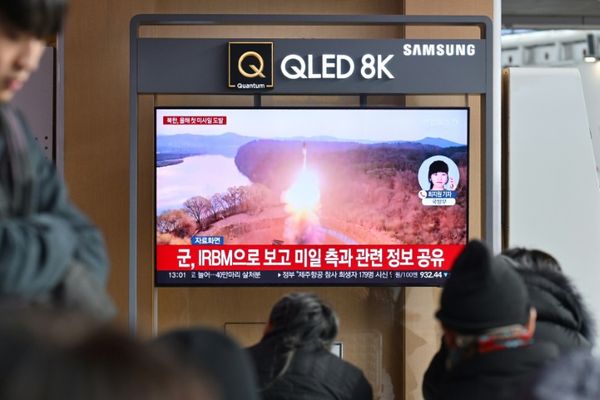
The U.S. Senate narrowly struck down legislation that would block billions of dollars’ worth of arms sales to the United Arab Emirates, marking the latest showdown between the White House and lawmakers over America’s relationship with Persian Gulf countries involved in the deadly conflict in Yemen.
The Senate voted 49 to 47 against the resolution that would block the sale of F-35 fighter jets to the UAE and 50 to 46 against blocking the sale of MQ-9 Reaper drones to the UAE. The outcome of the vote dashed hopes for some lawmakers to offer a final rebuke of the Trump administration’s aggressive arms sales policies in the final weeks of his administration.
The vote fell mostly on party lines, with Democrats supporting the measure and Republicans against it, sending a stark signal to the incoming Biden administration about his party’s opposition to the sales.
Though the resolutions stood little chance of blocking the sales even if passed—Trump threatened to veto the measures if it came across his desk—lawmakers proceeded with the vote anyway. Congressional aides said the move was meant to lay down a marker for the administration and to send a signal to the incoming administration that they are unlikely to support U.S. arms sales to the Gulf and U.S. military support for the Saudi- and UAE-led coalition in Yemen.
The vote distilled years of fierce debates over some of the Trump administration’s most controversial foreign-policy priorities: its cozy relationship with Gulf countries, the president’s authorities to engage in military activities abroad without prior congressional approval, the administration’s hard-line policies toward Iran, and U.S. involvement in the conflict in Yemen, which is considered the worst humanitarian crisis in the world.
Democratic Sen. Chris Murphy of Connecticut, speaking on the Senate floor on Wednesday, said he opposed the arms sales because they did not go through proper Congressional review channels and the administration hadn’t adequately addressed concerns from lawmakers about how the UAE would handle high-end U.S. military technology.
He also urged Republicans to back the measure, saying they would want such buy-in when President-elect Joe Biden, a Democrat, takes the White House in January.
“Believe me, my Republican colleagues are going to want that right when a Democratic administration comes into office. You’re not going to want to send a signal today to the Biden administration that they don’t have to consult with you as the majority party potentially in 2021,” Murphy said.
Lawmakers who supported the arms sales said it was critical for deterrence against Iran and would not undercut Israel’s military superiority in the region. “These sales can provide a critical deterrent against Iran’s increasing threats to UAE and others, especially following the lapse of the arms embargo, and they send a clear message to Russia and China that the United States remains the preferred partner in the region,” Sen. Jim Risch, the Republican chairman of the Senate Foreign Relations Committee, told Foreign Policy. “These sales are representative of already changing dynamics in a historically troubled region, and Congress should support them.”
The Biden administration is expected to face pressure from the outset to extricate the United States from involvement in the war in Yemen, which consists of arms sales, logistics, and intelligence support to the Saudi- and UAE-led coalition fighting Iran-backed Houthi rebels.
“Congress and the incoming Biden administration should do all they can to halt these arms sales and make a cease-fire and political settlement their top priority in Yemen,” said Scott Paul, a humanitarian policy expert at Oxfam America.
The arms sales, to the tune of nearly $23.4 billion, includes 50 F-35s, 18 MQ-9 Reaper drones, and $10 billion worth of munitions. Once finalized, the UAE will become the second country in the region, after Israel, to obtain high-end U.S. stealth fighters—and the first Arab country to do so.
The State Department approved the sale in November, following the Abraham Accords that normalized relations between the UAE and Israel, the United States’ closest historic ally in the region. Within days, Sens. Bob Menendez, a Democrat; Rand Paul, a Republican; and Murphy put forward resolutions to block the sales. Rep. Ilhan Omar, a Minnesota Democrat, put forward similar resolutions on the House side.
Even before the vote, Trump signaled he would veto the legislation if it passed. Overriding the veto would have required a two-thirds majority in the Senate.
Supporters of the arms sale also included former senior administration officials who had clashed with the president on other policy issues—though not his hawkish policies toward Iran.
“U.S. weapons are needed more urgently to defend against Iran’s threat in the Gulf,” John Bolton, Trump’s former national security advisor, wrote in a Wall Street Journal op-ed ahead of the Senate vote. Bolton and others argue that withholding weapons sales will not improve the dire humanitarian situation in Yemen, where around 16 million people are on the brink of famine. Former Defense Secretary James Mattis has also privately tried to convince wary senators to back the arms sales, as the Huffington Post reported on Tuesday.
Opponents of the sales argue that, in addition to exacerbating the humanitarian crisis in Yemen, such arms transfers could expose sensitive U.S. military technology to foreign adversaries like Russia and China, given the two countries’ ties with the UAE.
Human rights watchdogs have accused both the UAE and Saudi Arabia of misusing U.S. weapons and indiscriminately targeting civilians during its military campaigns in Yemen against the Houthi rebels. A CNN investigation in 2019 found that Saudi Arabia and the UAE transferred U.S.-made weapons to fighters in Yemen who were linked to al Qaeda and hard-line Salafi militias. The UAE government has denied these allegations. The Trump administration cleared the UAE of wrongdoing after an internal investigation, CNN reported in May. But some lawmakers, including Murphy, said they still have unanswered questions and do not believe the matter has been fully resolved.
“Even those who would be open to selling weapons to the UAE broadly speaking are concerned by how unique the case of F-35s are and how quickly this sale is being pushed through,” said Elana DeLozier, an expert on Yemen at the Washington Institute for Near East Policy, a think tank. “They’re concerned about the speed of the push in part because they feel the questions raised about potential UAE tech transfers in Yemen weren’t sufficiently answered.”
The UAE Embassy in Washington has rejected criticisms from Democratic lawmakers ahead of the scheduled vote this week, responding to criticism from Murphy on Twitter that descriptions of the UAE having close partnerships with Russia and China is a “gross overstatement.”
“The UAE need for advanced drones is a response to their growing sophistication and deployment by adversaries across the region, including Iran and non-state actors. They are critical to the UAE’s defense just as they are to the US and other partners,” the UAE Embassy tweeted. “We would rather have the best US-equipment or we will reluctantly find it from other sources, even if less capable.”
The embassy did not immediately respond to a request for comment.
The UAE drew down the bulk of its forces in Yemen in 2019, after nearly five years of impasse in the conflict there. While the UAE doesn’t publicly broadcast its force posture in Yemen, experts and analysts estimate that the country keeps several hundred troops in southern Yemen, primarily for counterterrorism operations. The UAE also provides integral support to the Southern Transitional Council, a separatist group in southern Yemen that is in a tenuous alliance with the internationally recognized Yemeni government.
But even though the outgoing Trump administration and the incoming Biden administration have pledged to continue normalization between Israel and Arab nations like the UAE, the failed vote shows the increasing willingness of Congress to challenge U.S. arms sales to the Gulf on a bipartisan basis, owing to anger over the Saudi-led war in Yemen. After Senate Foreign Relations Committee ranking member Menendez had held up sales of precision-guided munitions to the UAE and Saudi Arabia for more than a year, the Trump administration in May 2019 forced through the $8 billion in sales using emergency authorities, overriding a congressional resolution of disapproval from a majority of lawmakers.
That emergency declaration—which used a pathway meant to provide weapons to allies facing imminent military threats—has come under increasing scrutiny from lawmakers and government watchdogs in recent months. In a letter earlier this year, House Foreign Affairs Committee Chairman Eliot Engel and fellow Democratic panel member Rep. Andy Levin accused Secretary of State Mike Pompeo of directing “the invention” of an emergency in April 2019. The State Department’s own inspector general said in an August report that Pompeo had acted within his legal authority to declare the emergency to fast-track the sale, but he did not properly account for humanitarian concerns stemming from the Saudi-led air war in Yemen.







